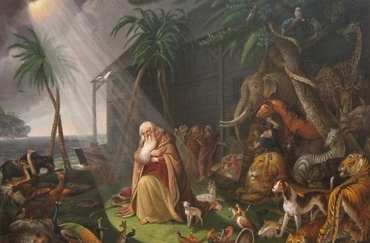Arcana Coelestia # 120
120. Like Egypt, the Euphrates too means knowledge or facts, and also sensory evidence from which facts are obtained. This is clear from the Word in the Prophets, as in Micah, She, my enemy, said, Where is Jehovah your God? A day on which He will build your walls. On that day what has been determined will be absent afar off. That day also He will come to you from Asshur, and to the cities of Egypt and to the River (the Euphrates) Micah 7:10-12.
The Prophets spoke in this way when referring to the coming of the Lord, who was going to regenerate man so that he would become as a celestial man. In Jeremiah,
What have you to do with the way to Egypt, to drink the waters of Shihor? And what have you to do with the way to Asshur, to drink the waters of the River (the Euphrates)? Jeremiah 2:18.
Here similarly 'Egypt' and 'the Euphrates' stand for facts, and 'Asshur' for reasonings based on them. In David,
You did cause a vine to journey out of Egypt. You did cast out the nations, You did plant it. You did send out its shoots even to the sea, and its little branches to the River (the Euphrates) Psalms 80:8, 11.
Here too 'the river Euphrates' stands for sensory evidence and factual knowledge. Indeed the Euphrates was the boundary to Israel's territories in the direction of Asshur, just as factual knowledge in the memory is the boundary of intelligence and wisdom of the spiritual and celestial man. The same is meant by these words addressed to Abraham,
To your seed I will give this land, from the river of Egypt even to the great river, the river Euphrates. Genesis 15:18.
Both of these two boundaries have the same meaning.
Beast

In Genesis 1:24, beasts signify the things of man's will or loves. (Arcana Coelestia 44, 46)
In Genesis 9:10, beasts signify all that was living in the man of the Ancient Church, and also what belonged to his new will; likewise the lower things of his understanding and the will therefrom. (Arcana Coelestia 1026-1029)
In Psalm 104:20, beasts signify affections longing to be instructed, or spiritually nourished. (Apocalypse Explained 650[10])
In Luke 10:35, since the beast was a donkey, this signifies to instruct another according to his capability. (Apocalypse Explained 1154)
The beast of the south (Isaiah 30:6) signifies people who are principled in the knowledges of good and of truth, but do not apply them to life and instead to science.
Every beast and creeping thing (Genesis 8:19) signifies the goodnesses of the internal and external man.
"Beasts" represent the affection for doing good things, a true desire to do them from the heart. In the negative sense, "beasts" stand for the lust to do evil.
The beast ascending out of the sea (Revelation 13:1) signifies reasonings from the natural man confirming the separation of faith from life.
(Odkazy: Apocalypse Explained 13, 773; Revelation 13:11)






